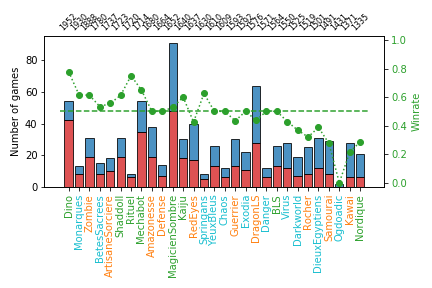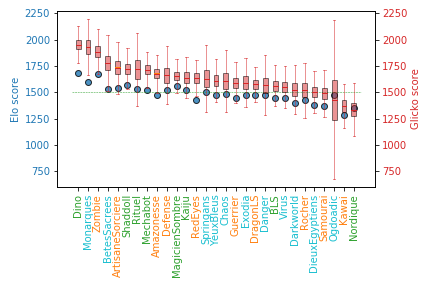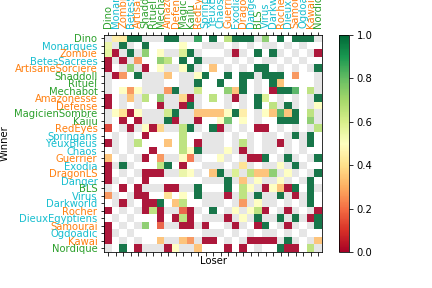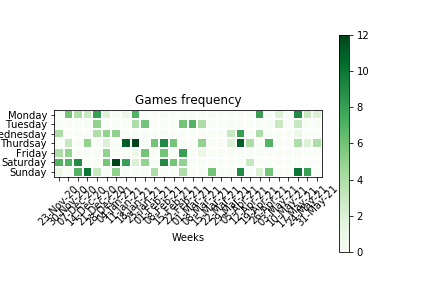Ranking system for Yu-Gi-Oh! gaming with friends
The basic functionality of the code is to register decks (name only), players (name only) and games played between decks, with a winner and a loser.
So far, one may:
- manage decks (add new deck with given owner, delete deck)
- manage gaming history (add new game, delete n last games)
- compute Elo and Glicko2 scores
- visualize results on graphs
TO-DO list:
- short-term:
- result=DRAW
- assign_color_per_player() to take into account more than 3 players and assign colors semi-randomly
- long-term:
- user-interface for easy access
- any proposition of statistic or graph that may be missing
The code was intended to be used in a collaborative way, i.e., several players playing against each other. Each player may own several decks, but the exact same deck cannot be shared between players. Games are registered, and a ranking is made between decks (hence players somehow).
Note: it is also possible to use the code as a self-analysis tool against meta: a player enters their deck and every deck they expect to be encountering at tournaments. Whenever the player enounters a deck from the meta, they enter the result in the system. Then, the code may show their performance against each deck of the meta as a ratio of win/lose.
More details about the Elo rating system can be found here: https://en.wikipedia.org/wiki/Elo_rating_system
More details about the Glicko rating system can be found here: https://en.wikipedia.org/wiki/Glicko_rating_system The score and related values are computed using Mark Glickman's original code, see: http://www.glicko.net/glicko.html
# 1. Import modules
import ygomanagement as ygom
import ygoranking as ygor
import ygostats as ygos
# 2. Define files location if necessary
ygom.DECK_LIST_FILE = './...'
ygom.GAME_HIST_FILE = './...'
ygor.DECK_RANK_FILE = './...'
# 3. Add decks
ygom.add_deck('deck_name_1', 'deck_owner_1')
ygom.add_deck('deck_name_2', 'deck_owner_2')
# 4. Add games - first deck referenced is considered the winner
ygom.add_game('deck_name_1', 'deck_name_2') # player 1 won
ygom.add_game('deck_name_2', 'deck_name_1') # player 2 won
ygom.add_game('deck_name_1', 'deck_name_2') # player 1 won the BO3
# 5. Compute scores relative to games at previous steps - not done automatically
ygor.compute_all_scores()
# 6. Visualize results - functions generally start with 'show_'
# Bar plot
ygos.show_bars()
# Match-ups map
ygos.show_map()
# Games frequency - GitHub-like, based on date of registration
ygos.show_games_frequency()
# Players winrate over time
ygos.show_player_stats()
# Optionally, export figures
ygos.export_examples()
# 7. When opening a new session, you can add new decks, new games and visualize new results
# Be careful to always recompute results based on registered games (step 5)


